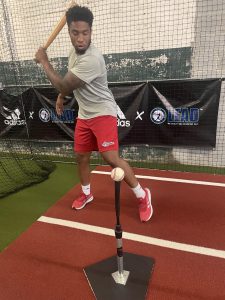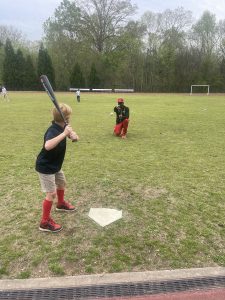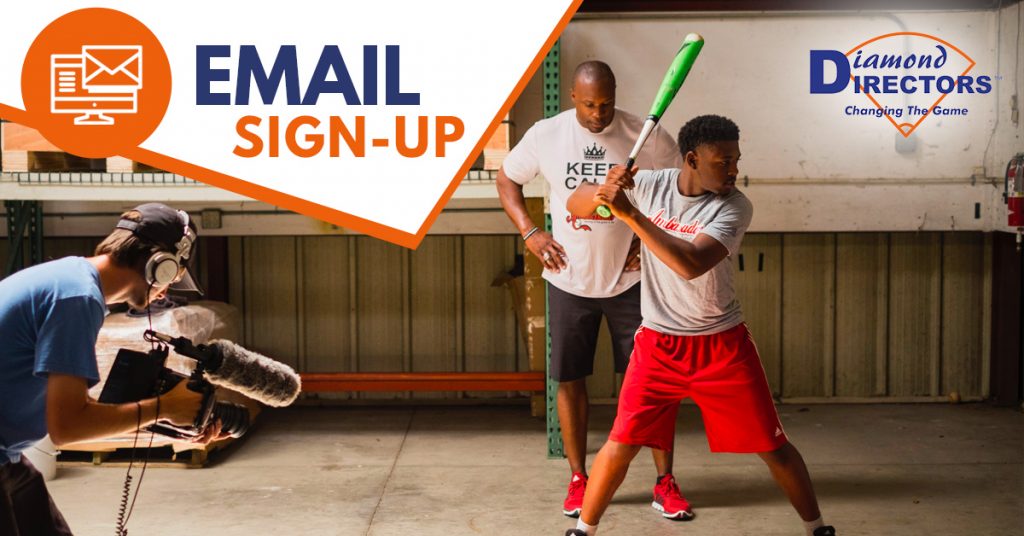
Spring is here and this is my favorite season of life. Flowers start to bloom. The sun seems to shine brighter and bats are hitting baseballs.
It also is the time to be grateful for the coaching support I have in young men like Tre Hampton and Andre Paris. They are a blessing to me and can be for you as well.
I recently sat down with them to get their thoughts on what the game of baseball means to them.
Who’s your favorite MLB team and why?
Tre Hampton: My favorite is the Atlanta Braves mainly because I am from suburban Atlanta. I grew up watching my heroes such as Rafael Furcal, Bobby Cox and Andrew “Chipper” Jones. That was my childhood in a nutshell.
Andre Paris: It’s the Atlanta Braves. I’ve always been a hometown fan, so I’m going to root for every professional team in my state. As a child, going to my first Braves game made me fall in love with the team. Getting to see Chipper Jones hit a home run at that game was such a magical experience.

What do you enjoy most about your job as a L.E.A.D. Center For Youth Program Coordinator Intern?
Hampton: Being around the game I love and being able to be a mentor. I am all about helping boys become men. That’s the main reason I coach. A lot of the kids we serve come from dysfunctional home situations or just are having a hard time being raised in the inner city.
Someone like me, who was raised by his mother, can empathize with a lot of them. Some of these Ambassadors’ futures are in serious jeopardy and they don’t even know it. It’s not their job at this age to worry about these things.
Paris: Being able to mentor young Black males is my favorite part. It’s fun and rewarding to be able to teach the game of baseball, while also being able to be a relatable and understanding mentor to the situations they are facing. The relationships I get to build are what I enjoy the most because they will last beyond playing baseball.
What’s a go-to drill for helping hitters get out of their slumps?
Hampton: It depends on the dynamic of the slump. If I have a Junior Ambassador or Ambassador who’s making contact, but he’s not squaring anything up, I’ll access his swing and put him on the tee. This is the best drill, especially for elite level players who have great mechanics. If they are slumping, but are making contact, there is a good chance their swing is just out of sync.
What I love about the tee is you can place the ball at any location in the strike zone and see how their body/swing responds to that location. If you swing and the ball is not back-spinning on a line to the back of the cage, you know where the hole in the swing is. You can make the adjustment.
Since the ball is not moving, the tee is going to make you be more consistent in your movements, which help to produce a great swing. Baseball is a game of repetition, and doing numerous amounts of swings off the tee can help anyone, no matter the skill level.
The core value I struggled with most as a child, which I excel at now, is teamwork… As I got older, and my mindset evolved, I realized the importance of depending on the people around me. — Andre Paris
Now, if a player is slumping and his strikeout numbers are up—meaning he’s not making any contact—as a coach, the first thing I’ll do is give him a day off to get his mind off the game. You have to make sure the mental part of the game is right.
But as far as drills go, I would go with a vision drill. Have him stand in the box and face a live pitcher or pitching machine. Each ball delivered will have a colored dot on it, and as he hits it, he has to tell me what color the dot is on the ball.
For whatever reason, sometimes a hitter is not seeing the ball, which raises his strikeout numbers. That could be due to a plethora of things, such as “pressing” or just whatever is going on outside the game.
Paris: My go-to drill is the front toss. I prefer to do the basics—let the ball tell me what I need to do to help correct the player’s swing. The front toss is effective because you get to watch the ball fly. It provides instant results.
If the player is making solid contact and driving the ball; I believe it gives him the motivation he needs in his swing. When you make contact, eventually, those balls fall in for hits. If a hitter is doing front toss and missing the ball, he will need to adjust his timing. If he is making soft contact, then mechanically he will have to change some things to maximize his swing.
L.E.A.D. is governed by six Core Values: excellence, humility, integrity, loyalty, stewardship and teamwork. Which of these did you struggle with the most as a child, and which do you excel with now as a coach?
Hampton: I would say humility. As a child, I sometimes had that selfish attitude as an athlete. While it is something you need to have, you have to be able to control your ego. As a coach, I tell my Ambassadors and Junior Ambassadors to have a quiet confidence. If you have to tell people you are good, they probably are not, or they are just arrogant. We have no space for you on this team.
Paris: The core value I struggled with most as a child, which I excel at now, is teamwork. I’m a pretty reserved person, so growing up I tended to separate myself from groups because I liked being alone. While playing sports, I usually was the kid who could get it done alone. Sometimes I doubted my teammates because I felt I could be a superhero and carry the load alone.
As I got older, and my mindset evolved, I realized the importance of depending on the people around me. I started to understand that if a task was separated into smaller jobs, everyone could pitch in. It is more efficient that way and results in less stress. This allowed me to see the importance of working with others, because sometimes, individually we fall short.
What are the top three things all middle school and high school players must have to stay to become a college and/or professional baseball player?
Hampton: It starts with skill. Work on the five tools of baseball. If you want to play D-I baseball, you need at least one or two of these tools, especially the hit or power tool) As a pitcher, velocity is the best tool you can have. After that, having a big fastball is a plus, as well as a good follow up pitch.
Second is character. Who are you as a person? Coaches are going to do a deep dive into who you are when they are scouting and recruiting. How does your mind work? Can you think for yourself or do you rely on your parents for answers? Do you treat your opponents with respect? That starts with you. Do you treat yourself with respect? Have respect for the game. Is your uniform clean? Your cleats? How do you look on game day?
L.E.A.D. is preparing me for countless amounts of careers in the future. Honestly, all I have to do is pick one that suits me. I have been exposed to so many opportunities. — Tre Hampton
What do your coaches and fellow players think about you? Your academic advisers and teachers? How do you perform off the field—in the classroom? I do not have time for weak- minded players in my program. I’m looking for Ambassadors and Junior Ambassadors who not only want to win ball games, but want to become even greater men.
The last skill is work ethic. It must be unmatched. Talent will only get you so far. As a coach, I want to feel a player’s handshake. If I don’t feel or see any calluses, that’s a red flag for me.
As a bonus, you have to be coachable.
Paris: Players on every level have to be coachable. That means having a resilient attitude and a good work ethic. Being coachable is very important because coaches are one of the most important resources you need to get to the next level. You have to be willing to take criticism in order to benefit yourself as an individual and benefit your team.
A resilient mindset is also important because baseball is a game of failure. Having the ability to fail, and still go back and not let it affect you the next time around is what separates good players from great players.
And a good work ethic will separate a talented and lazy player from an average and hardworking player. To be successful at any level of a sport, you have to be willing to perfect your craft and put in the time and reps. If you can get up and practice, and take those extra swings and make those extra throws—even on days when you don’t feel like getting out of bed—you will see results on the field.
What career is L.E.A.D. preparing you to do 10 years from today?
Hampton: To become one of the best college baseball coaches in the country.
Paris: L.E.A.D. is preparing me for countless amounts of careers in the future. Honestly, all I have to do is pick one that suits me. I have been exposed to so many opportunities. I have a range of choices, all the way from being a manager of a team to being in the front office of an organization.
Personally, I would prefer to do marketing and apparel for a company. I have had the opportunity to connect with many people holding those positions who I can learn from.
To help keep your skills sharp, we have introduced a new type of Skill Build—our Virtual Skill Build—where I can help you develop hitting skills anytime, anywhere using anything.
Remember: Intelligence tops being smart.
For more information, visit www.diamonddirectors.com today. Also, check out our Digital Magazine.
C.J. Stewart has built a reputation as one of the leading professional hitting instructors in the country. He is a former professional baseball player in the Chicago Cubs organization and has also served as an associate scout for the Cincinnati Reds. As founder and CEO of Diamond Directors Player Development, C.J. has more than 22 years of player development experience and has built an impressive list of clients, including some of the top young prospects in baseball today. If your desire is to change your game for the better, C.J. Stewart has a proven system of development and a track record of success that can work for you.

Leave a Reply